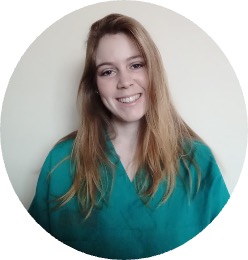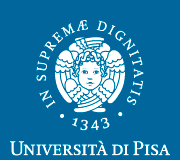
E-mail: francesca.bindi@phd.unipi.it
Supervisore tesi: Prof.ssa Micaela Sgorbini
Titolo Progetto: Studio di biomarcatori (BIOs) di stress ossidativo in equidi affetti da Sindrome della Risposta Infiammatoria Sistemica (SIRS) e sepsi
Abstract: La Sindrome della Risposta Infiammatoria Sistemica (SIRS) è una risposta immunitaria di tipo sistemico, non specifica, che si verifica a seguito di insulti nei confronti dell’organismo, siano essi di natura infettiva o non infettiva. La sepsi invece è definita come l’associazione di uno stato di SIRS ad una condizione di infezione ad eziologia batterica. La sepsi è una condizione piuttosto comune e grave negli equidi. Mentre nei cavalli adulti la prognosi dipende fortemente dal processo primario di malattia, nei puledri il tasso di sopravvivenza si attesta frequentemente tra il 45 e il 60%. Prognosi più favorevoli si possono conseguire in caso di diagnosi e trattamento precoce. Tali obiettivi risultano di difficile realizzazione a causa della bassa sensibilità dell’esame colturale e della soggettività degli score clinici. Pertanto, in medicina veterinaria è aumentato l’interesse nella ricerca di biomarkers (BIOs). Lo scopo del presente lavoro di ricerca è quello di studiare un panel di BIOs di stress ossidativo in equidi affetti da SIRS e sepsi al fine di individuare molecole che siano in grado di favorire in termine di sicurezza e precocità la diagnosi. Ulteriore obiettivo è quello di identificare dei BIOs puntuali per l’attuazione del follow-up. Il conseguimento di tali obiettivi consentirebbe di ottimizzare la terapia al fine di ottenere la massima efficacia terapeutica anche in considerazione dell’importanza dell’uso prudente dei farmaci antibiotici.
Project Title: Study of Oxidative Stress Biomarkers (BIOs) in Equids Affected by Systemic Inflammatory Response Syndrome (SIRS) and Sepsis
Abstract: Systemic Inflammatory Response Syndrome (SIRS) is a non-specific, systemic immune response that occurs following insults to the organism, whether of infectious or non-infectious origin. Sepsis, on the other hand, is defined as the presence of SIRS associated with a bacterial infection. Sepsis is a relatively common and severe condition in equids. While in adult horses the prognosis largely depends on the underlying disease process, in foals the survival rate often ranges between 45% and 60%. More favorable outcomes can be achieved with early diagnosis and treatment. However, these goals are challenging due to the low sensitivity of culture testing and the subjectivity of clinical scoring systems. Therefore, there is growing interest in veterinary medicine in the identification and study of biomarkers (BIOs). The aim of this research project is to investigate a panel of oxidative stress BIOs in equids affected by SIRS and sepsis, with the goal of identifying molecules that could enable safer and earlier diagnosis. A further objective is to identify specific BIOs for effective follow-up monitoring. Achieving these goals would allow for the optimization of treatment protocols to maximize therapeutic efficacy, particularly considering the importance of prudent antibiotic use.
ORCID: https://orcid.org/0009-0004-5174-7339
Comunicazioni orali a congresso
- Bindi F, De Marchi L, Vernaccini M, Spadari A, Rinnovati R, Nocera I, Meucci V, Bonelli F, Sgorbini M. Evaluation of a panel of oxidative stress bomarkers in healthy and colic horses: preliminary study. 76th SISVET Conference, 21st-24th June, Bari, Italy.
- Vitale V, Parietti C, Bindi F, Briganti A, Bonelli F, Sgorbini M. Bronchoalveolar fluid cytology in the donkey: comparison of different stainings. 76th SISVET Conference, 21st-24th June, Bari, Italy.
- Bindi F, Sorvillo B, De Marchi L, Celardo S, Sala G, Sgorbini M. Evaluation of oxidative stress biomarkers in the neonatal foal: preliminary study. 29th SIVE International Congress, 2rd-3th February, Florence, Italy.
- Bindi F, Tognetti E, Vezzosi T, Vitale V, Marmorini P, Sgorbini M. Feasibility of electrocardiographic recording in foals using a new smartphone-based digital stethoscope. 77th SISVET Conference, 12th-14th June, Parma, Italy.
- Bindi F, Elias A, De Marchi L, Vitale V, Spadari A, Rinnovati R, SalaG, Bonelli F, Sgorbini M. Evaluation of novel biomarkers (BIOs) in healthy and colic horses: correlation with Systemic Inflammatory Response Syndrome (SIRS) status and outcome. 17th Congress of the European College of Equine Internal Medicine, 14th-16th November, Copenhagen Denmark.
Poster a congresso:
- Bindi F, Vernaccini M, Nocera I, Turini L, Fanelli D, Sgorbini M. Relationship between APGAR score, semiological parameters, hemato-biochemical parameters, and evaluation of the transfer of passive immunity in the mule foal at birth. 28th SIVE International Congress, 3rd-4th February, Venice, Italy.
- Vernaccini M, Bindi F, Nocera I, Fanelli D, Sgorbini M. Hematology and clinical chemistry in mule foals from birth to two months of age. 28th SIVE International Congress, 3rd-4th February, Venice, Italy.
- Bindi F, Nocera I, Vallesi G, Meucci V, Bonelli F, Spadari A, Rinnovati R, Sgorbini M. Evaluation of symmetric (SDMA) and asymmetric (ADMA) dimethylarginines in healthy and in systemic inflammatory response syndrome (SIRS) negative or positive colic horses. 16th Congress of the European College of Equine Internal Medicine, 27th-28th October, Lyone, France.
- Bindi F, Vezzosi T, Zucca E, Caivano D, Freccero F, Sgorbini M. Evaluation of a new smartphone-based digital stethoscope featuring phonocardiography and electrocardiography in adult horses. 16th Congress of the European College of Equine Internal Medicine, 27th-28th October, Lyone, France.
Premi
Vincitore Premio SICLIM-Vet 2023, Vincitore premio quale migliore presentazione orale nell’ambito della sezione equidi tenuta durante il 76° Congresso SISVET di Bari (Italia), Titolo presentazione orale: Evaluation of a panel of oxidative stress bomarkers in healthy and colic horses: preliminary study. Autori: Bindi F, De Marchi L, Vernaccini M, Spadari A, Rinnovati R, Nocera I, Meucci V, Bonelli F, Sgorbini M. Atti: 76° Convegno SISVET, 21-23 Giugno 2023, Bari, Italia, p. 221.
